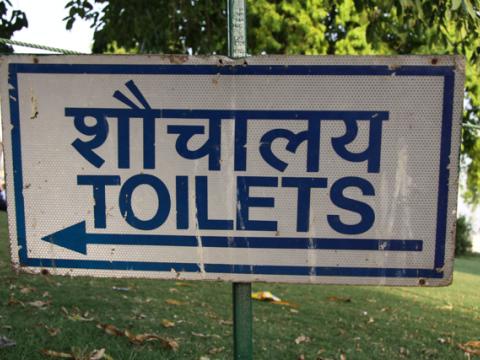Blog: Today is the first ever UN-endorsed World Toilet Day

Why did the toilet paper roll down the hill? To get to the bottom.
Has that joke left you flushed with amusement? Or was it a flash in the pan? Do you feel you got a bum deal from a supposedly serious editorial? Puns and humour abound whenever toilets or poop come into the conversation, and that’s understandable: over the last couple of hundred years the natural, inevitable act of defecation has been locked out of polite society, to be talked about only with humour or embarrassment. As India’s Rural Development Minister Jairam Ramesh recently said that “when we talk about sanitation we can only giggle.”
But that is about to change, because today is the first ever UN-endorsed World Toilet Day.
That may make you laugh too. After all, there are UN days for Africa Industrialization, Philosophy and Television, and that’s just in November. But behind the humour of toilets and pooping, there are some deadly serious facts and figures that make it obvious why 100 countries - from Afghanistan to Viet Nam - came together earlier this year to pass the resolution that enshrined an official UN World Toilet Day for the first time in history.
Here is one figure: 10 million viruses. That’s the number that can be found in only one gram of human faeces. Here is another: 2.5 billion. That’s how many people around the world still have no decent sanitation. One billion of them must do something called “open defecation”, or pooping in the open, in fields, on roadsides, on railway tracks. Every day, nearly two billion tons of human faeces, with a dizzying number of potential viruses, bacteria and worm eggs, are lying around our planet ready to be trodden on, touched or ingested in water and food.
The consequences are easy enough to calculate: Diarrhoea, caused by that contaminated food, water and environment, is still the second deadliest killer of children in the world, killing 1,600 children every day. Only pneumonia and respiratory infections are more deadly (by the way, World Pneumonia Day is in November too). Women and girls get a particularly raw deal, having to find somewhere safe to defecate in darkness for modesty’s sake, putting them at risk of rape and animal attacks (linked to another UN day in November focussing on violence against women). That children are dying from something as seemingly trivial as diarrhoea, or girls are getting raped because they have to find somewhere to do their toilet business: neither of those facts should make you giggle (International Children’s Day is also in November).
Yet the attention and funding given to sanitation and diarrhoea - which is easily preventable with adequate sanitation, safe water and good hygiene – have for decades been dwarfed by that given to other causes and challenges such as HIV/AIDS. When the Millennium Development Goals – a set of targets to reduce poverty and better maternal health and education amongst other things – were signed in 2000, sanitation wasn’t even mentioned. (It was added in the 2002 Johannesburg summit.)
Luckily, there is much more to celebrate now than ten years ago. Since 1990, 1.9 billion people have gained access to improved sanitation (although population growth means the number without scarcely changed). Even so, on average, 26,000 Africans gained access to sanitation every day, and there are 244 million fewer people defecating in the open worldwide. Also, we’re doing our sums better. The World Bank’s Water and Sanitation Program has launched an Economics of Sanitation Initiative that is producing figures to dazzle any treasury minister, calculating that a country can lose 1.5% of its GPD to costs incurred by poor sanitation (economic loss, hospital costs. Kenya loses $324 million a year in this way. India is $54 billion out of pocket (that’s the entire GDP of Croatia). But we can look at those figures from another angle: if we can figure out how to install adequate sanitation for 2.5 billion people, we can save $260 billion a year. Investing $1 in installing sanitation can save up to $5 in economic losses avoided. No matter how you do your sums, that’s a bargain.
Other cheering connections are being made between sanitation and other fields and departments. After research showing that sometimes up to a quarter of schoolgirls drop out of school permanently because of the simple lack of a toilet (usually when they begin menstruating), WASH – water and sanitation and hygiene - in Schools initiatives have multiplied. Experts in malnutrition now understand that sanitation plays a vital role in both the problem and the solution. Improving sanitation can reduce stunting and improve nutrition, the economy and development.
So do laugh by all means. All these new connections and understandings are causes for jubilation, and World Toilet Day is a wonderful way to celebrate them. It’s also a new spotlight on a public health crisis that has been hidden by shame for far too long. If jokes work at getting people to turn their attention to sanitation, let’s keep telling them.
Michel Jarraud, Chair of UN-Water, and Secretary-General of the United Nations World Meteorological Organization (WMO)
Hon. Anna Kajumulo Tibaijuka, Minister of Lands, Housing and Human Settlements Developments, United Republic of Tanzania, and Chair of the UN-hosted Water Supply and Sanitation Collaborative Council (WSSCC)
HRH Prince El Hassan bin Talal, Chair of UNSGAB, the United Nations Secretary-General's Advisory Board on Water & Sanitation
Learn more at: www.worldtoiletday.org
Say 'thank you' to your toilet this World Toilet Day
Learn the facts about diarrhoea and what Child Health Now is doing about it